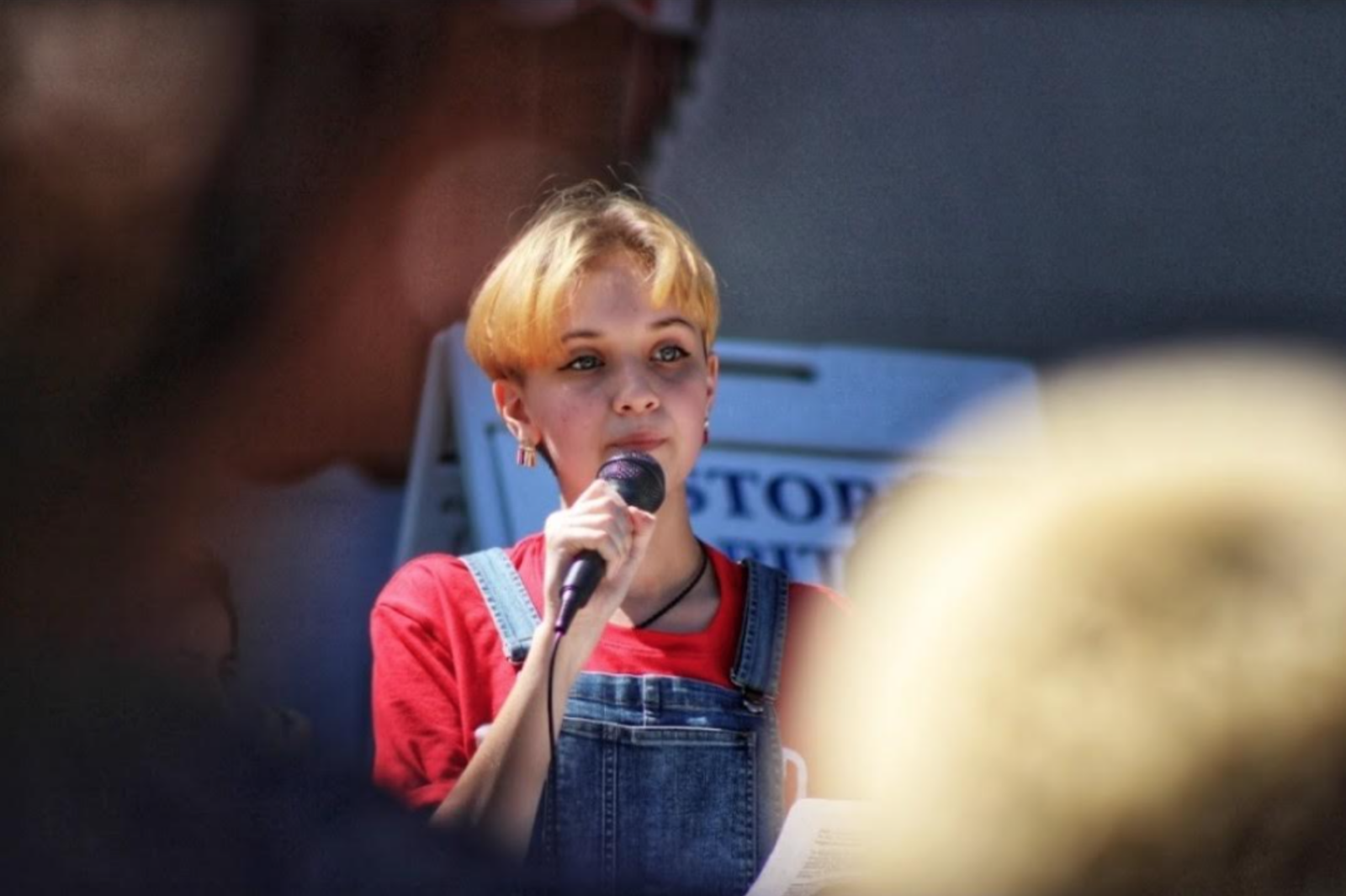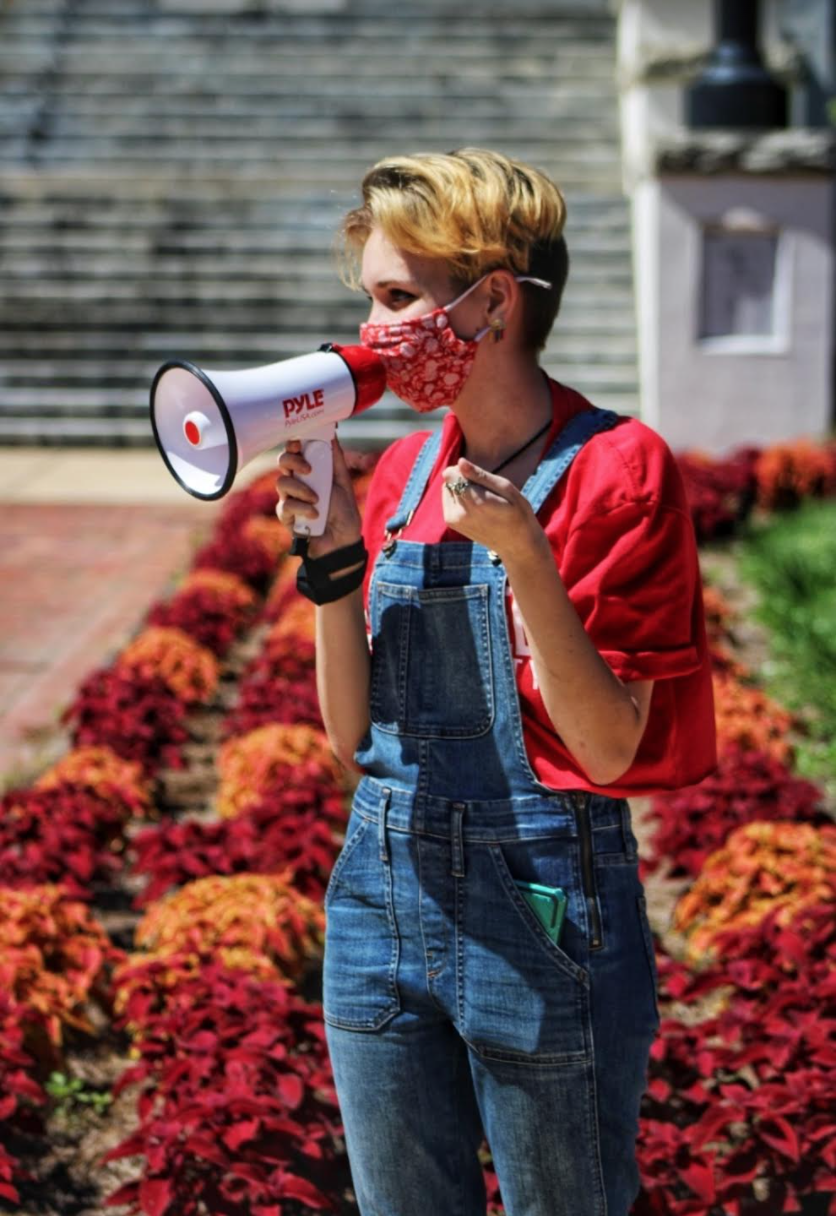ACE INTERVIEW: Charlotte Stuart-Tilley on Climate Change and Consumption
|
March 10, 2022

Charlotte Stuart-Tilley (they/them and she/her) is a GenCLEO strategist with the CLEO Institute, working with fellow youth to make change in their communities. They are in their junior year of high school and hope to major in geology or environmental sciences when they reach college. Charlotte is currently based on Mvskoke-Creek land, in Tallahassee, Florida. Stuart-Tilley is particularly interested in focusing their work within the broader climate movement on the ways in which consumption culture contributes to the climate emergency.
Nico Lovejoy (NL): When did you first learn about the climate crisis? What was your immediate reaction?
Charlotte Stuart-Tilley (CS): I don’t remember the first time I heard of the climate crisis! I was born in 2005, so subliminal messaging made it always an issue. I don’t think I recognized the severity of the crisis or really thought about it until 6th grade–but then I found it overwhelming. We’re taught about the simple fixes, like recycling or other things we do in our everyday lives but as wonderful and innovative as these things can be, they’re not going to be the only thing that solves this crisis. It’s such an incredibly multi-faceted problem, one that we can only address by tackling all issues at once. Realizing that was exhausting.
NL: When did you first decide to get involved in climate activism? How and why did you come to that decision?
CS: When I was in 8th grade, I checked the news one morning and found an article about Greta Thunberg. She had only been involved in school strikes for a month or two up to this point and had finally broken international news. I admired her grit and her age. I wanted to do something big like her but to be honest, I didn’t really think about the climate crisis as the issue I wanted to tackle. It was only when I read articles she had suggested and did a little more research that I considered doing something myself! I’ve always been an anxious person, especially when it comes to worrying about the future. The climate crisis is the biggest threat to the future. I think I realized that people don’t take the issue as seriously as they should. This is the issue we will face for generations, not a temporary problem. I decided I wanted to hold a school strike of my own (despite being homeschooled with very supportive parents, haha) and I booked a reservation at the Capitol! With the help of many organizers who worked in the climate community long before I was in the picture, I held a rally with over 100 people. The next rally, two weeks later? 3 people. That was an important lesson in organizing!
NL: You are particularly interested in the ways in which consumption patterns relate for the climate crisis. What does the word “overconsumption” mean to you?
CS: Overconsumption, for me, is the use and colonization of resources from others, due to a false sense of scarcity or poor management of resource allocation. That’s a lot of words for, some people take more than is necessary. Everything we use, eat, interact with takes resources. This is how the world works and that’s okay! It always has. Right now, however, the wealthiest (largely white) people and countries consume more than their fair share of resources, at a time when we should be abandoning things like fossil fuels, which produce the products they use. If everyone lived like Americans, we would need 4 Earths to sustain us all, according to the BBC.

NL: How does consumption relate to the climate crisis?
CS: The overconsumption of white, “developed” countries creates excess emissions. Obviously, excess emissions have increased the urgency of the climate crisis. And the political influence of corporations that produce what we use cannot be undermined– if they don’t want a system to change, they can stall and stop people who come in their way. The system as it is has been creating climate change and social/wealth inequalities for decades, if not centuries.
NL: To what extent do our individual consumption habits impact the climate crisis?
CS: I would like to think that they do but the reality is that it’s about the system more than anything. We are all a part of the system, of course, but I worry that people reading this will stress over their individual habits more than it’s worth. The true benefit to changing consumption habits is that you’re also changing your mindset about your relationship with stuff. If you think about what you’re buying and the products you’re consuming, you may learn something about your relationship with the world.
NL: What would a systematic change to consumption culture look like?
CS: I see a future where advertising and media don’t constantly surround us. And “Donate Don’t Dump” laws are popping up around the world, encouraging companies to donate their unsold and overproduced products! I also see a personal change for people’s relationship with stuff. I think we all experience a connection to the things we own, which allows you to value the resources and time that went into creating them. But sometimes, this relationship becomes toxic–when we feel a need to buy new things to increase social status or personal satisfaction. That’s when overconsumption habits become a problem, for both our well-being and the climate crisis.
The true benefit to changing consumption habits is that you’re also changing your mindset about your relationship with stuff. If you think about what you’re buying and the products you’re consuming, you may learn something about your relationship with the world.
NL: How would a change in consumption culture impact the climate crisis? How would that impact everyday people’s lives?
CS: If people consumed less, I don’t think the climate crisis would end. There are so many issues and factors to cover. But I’m hoping that if people are mindful of their consumption habits, they’ll be mindful of who made them and what it took to get there. And that’s all I really ask!
NL: What are some examples of actions people can take to combat overconsumption?
CS: So many. The beauty of changing your consumption habits is that it isn’t really time-consuming. Joining a buy nothing group can be a great way to connect with your community and get second-hand items for free. If you’re a little brave, some people dumpster dive–but be mindful of local dumpster diving laws! I haven’t been bold enough to try it yet. Day-to-day, I always follow reduce, reuse, reimagine. Do you really need this thing? Can you get it secondhand and reuse it? Can you reimagine how to use it when you’re done with it?
NL: When was a time you felt proud of the impact you had made through your climate activism?
CS: I’ve had a lot of friends join me for rallies and things which I had never imagined they would get involved in. A few people who I didn’t know prior to striking got involved because they heard about me in the news! That feels good. I think about how different my life would’ve been if I hadn’t read that article. I doubt I would ever have done anything in activism at all.
NL: Do you think there should be more of a focus on consumption habits within climate activism? Why or why not?
CS: I think so. I like that it’s a tangible issue that people can do something directly with. Signing a petition might not achieve the full effect you want but choosing to not buy that extra t-shirt immediately saves those emissions and you can feel the difference.
NL: What is your advice to young people who want to get involved in climate activism?
CS: Find out who your local politicians are. Most people are unaware of them and that’s how they pass things that we don’t want! Even if you never get fully involved in any one issue, being an informed constituent (and voter) is critical to participating in any movement.
Photos courtesy of Charlotte Stuart-Tilley.
Answers may have been edited for length.
Want to read more? Check out the ACE Blog!
Join our Youth Action Network
More Blog Posts
Driving India towards self sufficiency and freedom from oil
India can shield itself from oil-price shocks and global pressure over Russian barrels by leaning harder into two strengths it …
Read More
Unnatural, Not Unprecedented
For two weeks, residents of Southern California endured a waking nightmare. Parents raced against time – hurrying down the driveway …
Read MoreCrafting a Vision for the Future: My Experience at LCOY USA 2024
Dry and sunny Tempe, Arizona where temperatures have been over 100 F for 113 consecutive days, delegates gathered to attend …
Read More